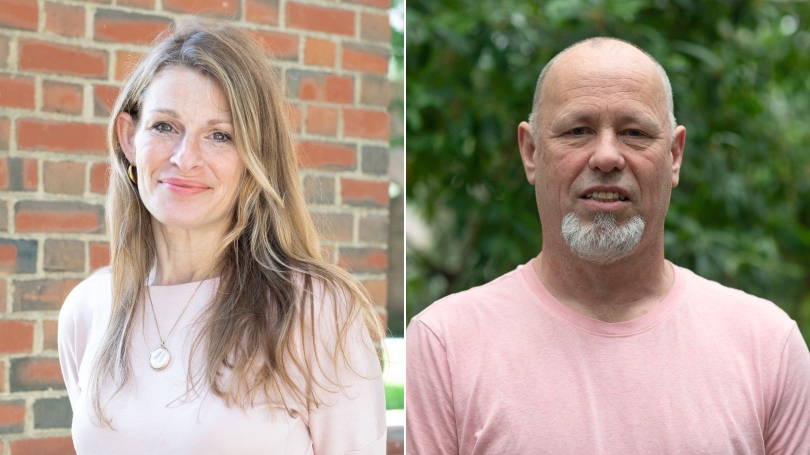
- Public Policy
- Leadership
- Funding
- News & Events
- About the Center
Back to Top Nav
Back to Top Nav
Back to Top Nav
Back to Top Nav
The Arts and Sciences staff were honored for their outstanding contributions to Dartmouth.
The Rockefeller Center's Dvora Greenberg Koelling and the Department of Biological Sciences' Craig Layne received 2025 Lone Pine Excellence Awards, which honor staff for their outstanding contributions to the Dartmouth community.
Greenberg Koelling was honored with the Passion and Commitment Award, which is given to an employee who demonstrates unwavering passion and commitment and who inspires others through their positive and engaging approach to their work.
Layne received the Innovation Award, which honors an employee who recognizes change as an opportunity for growth and innovation and is proactive and creative in enhancing productivity and effectiveness.
"You are the glue that holds us all together," President Sian Leah Beilock said during the awards ceremony on April 30. "We recognize it's hard to do your jobs right now, and we're so grateful for everything you're doing. As there's uncertainty and fear, as we really work to make sure that higher education at Dartmouth and beyond can uphold its values, it's the staff, your expertise, your support, your fostering of excellence, that really helps us do that."
'A vital part of our team'
Joining Dartmouth in 2019 marked a new chapter for Greenberg Koelling. She had recently lost her husband and wanted to find a role that would allow her three young children to "see their working mom energized by my work and not exhausted by it," she explains.
In 2023, she began her current role as assistant director of public programs and special events at the Rockefeller Center. No workday is ever the same, and that's part of why she loves it. One moment she might be coordinating travel logistics for a speaker; working with faculty, students, and vendors to create engaging speaker interactions, like class visits, lunches, and public programs; or managing on-site events.
"Dvora Greenberg Koelling is a vital part of our team at the Rockefeller Center," says Jason Barabas, government professor and director of the Rockefeller Center. "She is the point person on dozens of public programs and events each year, making it possible for us to hold high-level interactions with scholars, officials, and experts on a wide range of public policy topics confronting the world."
Greenberg Koelling always positions students at the center of each speaker visit, ensuring they have robust and meaningful opportunities for conversations about public policy. "Dartmouth is better because of Dvora's incredible levels of passion and commitment," Barabas says.
Greenberg Koelling finds inspiration in her team and the civically engaged students who give her hope for the future.
"Most importantly, I love that this work is centered in exploring complex policy issues from a wide range of viewpoints and experiences, which naturally requires good listening skills, hearing from experts and leaders, and trying to investigate and problem solve for the greater good of our small and large communities," she says.
'Invaluable' and 'innovative'
For the past 30 years, Layne has served as experiential learning facilitator in the ecology and evolution teaching laboratories. He is the mastermind behind many of the creative and engaging labs students have experienced in their ecology, evolution, and behavior courses.
Each week, Layne facilitates up to four distinct activities across multiple lab sections—collecting, consolidating, and analyzing data while working closely with teaching assistants to coordinate the activity's success. He prepares for each lab activity over the course of two to three weeks, which can involve hypothesizing, collecting and analyzing data, and interpreting results. He also designs, trials, and revamps new activities, bringing fresh insights and a positive approach even after three decades.
"Craig came to Biology in 1995 and wasted no time in making himself invaluable," says C. Robertson McClung, chair of the Department of Biological Sciences, recalling the time Layne initiated a field study on the evolutionary pressures that influence the size of galls on goldenrod plants to amass a valuable long-term dataset for student analysis.
"Running the labs requires him to wear many hats: He prepares equipment, organizes transportation to field sites, and coaches graduate students on their teaching techniques," McClung continues. "Thirty years of students have benefitted from his innovative thinking and can-do attitude."
For Layne, the most rewarding part of his work at Dartmouth is seeing students engage with, enjoy, and find value in ecological science. "My favorite feedback is when students tell me they did not think they would like an upcoming activity, sometimes even dreading it, only to hear after the fact that they really enjoyed it and learned something from it," he says.